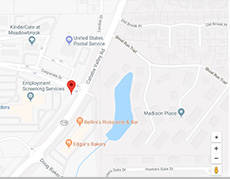
One of the biggest excuses we have is that we somehow feel God doesn't speak to us. This excuse shuts down our ability to hear from Him, trust Him and surrender to Him. All three things are integral when we are trying to change our habits, lose weight, get healthy and follow God's plan for our lives. When we don't think we have any clear direction from God, we are relying on our own intellect. We may know what to do, but our minds are overridden by our emotions.
As children, if we think we don't matter to the people who matter the most to us, it can set up a stronghold in us of "I don't matter to God," which can make us not trust the Holy Spirit, who lives inside us. I felt that way about my mother. She had an emotional illness, and I never really knew where I stood with her. Because Mom wasn't feeling well, as the oldest I had a lot of responsibilities. I was needed and felt it. Dad regularly told me this, as did my grandparents. I heard it from every place except the one place which really mattered. I didn't it from my mother.
God always wants the best for us and that is why He hates our excuses. Excuses are what keep us from following God and may even keep us from heaven. I am not saying this to scare you. I am saying it to make sure you are following what He wants you to do. 1 John 2:28 in the Message tells us, "And now, Children, stay with Christ. Live deeply in Christ. Then we'll be ready for Him when He appears, ready to receive Him with open arms, with no cause for red-faced guilt or lame excuses when He arrives."
Voices, voices everywhere. We hear them from friends, family especially if we have small children, mothers, fathers, extended family, best friends, worst enemies, television, social media, music, podcasts, speakers, preachers, teachers, mentors, casual acquaintances, and total strangers in the grocery store line. It makes us think we are going crazy with the noise in our minds. Our thoughts and decisions are somewhere in the mix. But it becomes so overwhelming that we can't even focus on what they really are.
To say we have no voice or say in what happens in our lives is an excuse for not surrendering to the Holy Spirit. We do have a voice but it means we are just living by every whim we have and not by God. Galatians 5:16 TPT tells us, "As you yield to the dynamic life and power of the Holy Spirit, you will abandon the cravings of your self-life." This lets us know that our voices will be dynamically powerful or marked by continuous productive activity and change in an energetic way when we make sure we have left behind our desires and cravings which seem to lead us down the wrong paths.
What disappoints you? Is it yourself? Is it circumstances you think you shouldn't have to go through? Is what you think God should have done for you think He didn't? Is it other people giving up on fulfilling their potential? When it comes to our personal failures and disappointments, it is very difficult to deal with. Case in point. when we really want such as to lose weight and try but fail. It's disappointing when it doesn't go as planned. When we hit roadblocks within ourselves it's hard to know what to do.
King David asked God a question I've asked myself many times. "Why am I discouraged? Why is my heart so sad? I will put my hope in God! I will praise Him again—my Savior and my God!" (Psalms 42:11 NLT). That's what we should do, but many times we don't. The word discouraged means to have lost confidence or enthusiasm, to be disheartened. In modern language that means to be beat down, gloomy, and dismayed. When you are discouraged it's like you have been knocked down and can't get up even after the referee has counted to 10. If you do get up, it's to drag yourself to your bed and stay there. You have no energy.
Is God listening to us when He doesn't answer our prayers like we want? Many times, we talk to God by what we are calling prayer. However, here's what we do. We tell God what we want Him to do. When it doesn't happen like we want it to happen, we wonder if He is really listening? We go to Him with our to-do list and then say, "Ok, talk to You when You've done all that." We had a monologue. Not a dialogue. God is the boss of the universe. We don't tell Him what to do.
How do we know if we really trust Jesus or not? He's the member of the Trinity who is most like us because He knows what it's like to live as a human. If we have a trust issue with Jesus, it will affect our relationship with those we love. Several years ago, I felt like I had a trust issue with Jesus. So, I asked, "Jesus, do I trust you completely?" I sensed there was still hesitancy. So, I asked Him, "When is the first time this mistrust happened?" I asked, "Jesus, is there a wall?" He said, "Yes." "Will you show me?" "Do you really want to see it now?" This time it was His voice speaking. I said, "Yes, of course. I don't want there to be a wall between You and me."
Being prideful is not just an attitude. It's also an emotion God hates. It's the emotion that He wants us to ditch, and He tells us exactly how to do that in His Word. Pride is the foundational emotion on which all other emotions, which lead to sin, are built. Pride says, "I'm number one, the best. I'm the best. No one can measure up to the great me." It is this worship of self that God doesn't like. It can lead to greater sins and is a huge emotion we must deal with on our journeys. To acquiesce to another, whether God or another person, means we must humble ourselves and accept their point of view or suggestion. Many have a hard time doing this. Saying, "You're right" and "I'm wrong" just doesn't seem to be in our vocabularies.












